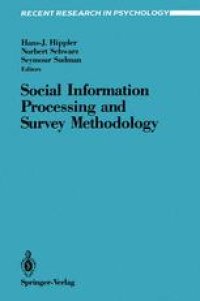
Ebook: Social Information Processing and Survey Methodology
Author: Hans-J. Hippler Norbert Schwarz (auth.) Hans-J. Hippler Norbert Schwarz Seymour Sudman (eds.)
- Tags: Psychology general, Statistics for Social Science Behavorial Science Education Public Policy and Law
- Series: Recent Research in Psychology
- Year: 1987
- Publisher: Springer-Verlag New York
- Edition: 1
- Language: English
- pdf
Survey researchers have long been aware that the way in which questions are asked determines the obtained responses. However, the exact processes that mediate response effects remained elusive. In the present volume, cognitive psychologists and survey methodologists explore the cognitive processes that underlie respondents' answers to survey questions. The contributors provide an introduction to information processing theories for survey researchers, review current knowledge of response effects in the light of recent theorizing in cognitive psychology, and report a number of experimental studies on question context and question wording. In combination, the chapters provide a theoretical framework for the analysis of response effects in surveys and raise a number of applied and theoretical issues that have so far not been addressed in cognitive psychology.
Survey researchers have long been aware that the way in which questions are asked determines the obtained responses. However, the exact processes that mediate response effects remained elusive. In the present volume, cognitive psychologists and survey methodologists explore the cognitive processes that underlie respondents' answers to survey questions. The contributors provide an introduction to information processing theories for survey researchers, review current knowledge of response effects in the light of recent theorizing in cognitive psychology, and report a number of experimental studies on question context and question wording. In combination, the chapters provide a theoretical framework for the analysis of response effects in surveys and raise a number of applied and theoretical issues that have so far not been addressed in cognitive psychology.
Survey researchers have long been aware that the way in which questions are asked determines the obtained responses. However, the exact processes that mediate response effects remained elusive. In the present volume, cognitive psychologists and survey methodologists explore the cognitive processes that underlie respondents' answers to survey questions. The contributors provide an introduction to information processing theories for survey researchers, review current knowledge of response effects in the light of recent theorizing in cognitive psychology, and report a number of experimental studies on question context and question wording. In combination, the chapters provide a theoretical framework for the analysis of response effects in surveys and raise a number of applied and theoretical issues that have so far not been addressed in cognitive psychology.
Content:
Front Matter....Pages i-viii
Editors’ Introduction....Pages 1-5
Social Cognition and Social Reality: Information Acquisition and use in the Laboratory and the Real World....Pages 6-41
Information Processing Theory for the Survey Researcher....Pages 42-70
Bipolar Survey Items: An Information Processing Perspective....Pages 71-85
Answering Survey Questions: The Role of Memory....Pages 86-101
Response Effects in Surveys....Pages 102-122
Thinking, Judging, and Communicating: A Process Account of Context Effects in Attitude Surveys....Pages 123-148
Attitude Measurement: A Cognitive Perspective....Pages 149-162
What Response Scales may Tell your Respondents: Informative Functions of Response Alternatives....Pages 163-178
Context Effects on Self-Perceptions of Interest in Government and Public Affairs....Pages 179-199
Styles of Interviewing and the Social Context of the Survey-Interview....Pages 200-211
Perspectives for Future Development....Pages 212-219
About the Authors....Pages 220-223
Survey researchers have long been aware that the way in which questions are asked determines the obtained responses. However, the exact processes that mediate response effects remained elusive. In the present volume, cognitive psychologists and survey methodologists explore the cognitive processes that underlie respondents' answers to survey questions. The contributors provide an introduction to information processing theories for survey researchers, review current knowledge of response effects in the light of recent theorizing in cognitive psychology, and report a number of experimental studies on question context and question wording. In combination, the chapters provide a theoretical framework for the analysis of response effects in surveys and raise a number of applied and theoretical issues that have so far not been addressed in cognitive psychology.
Content:
Front Matter....Pages i-viii
Editors’ Introduction....Pages 1-5
Social Cognition and Social Reality: Information Acquisition and use in the Laboratory and the Real World....Pages 6-41
Information Processing Theory for the Survey Researcher....Pages 42-70
Bipolar Survey Items: An Information Processing Perspective....Pages 71-85
Answering Survey Questions: The Role of Memory....Pages 86-101
Response Effects in Surveys....Pages 102-122
Thinking, Judging, and Communicating: A Process Account of Context Effects in Attitude Surveys....Pages 123-148
Attitude Measurement: A Cognitive Perspective....Pages 149-162
What Response Scales may Tell your Respondents: Informative Functions of Response Alternatives....Pages 163-178
Context Effects on Self-Perceptions of Interest in Government and Public Affairs....Pages 179-199
Styles of Interviewing and the Social Context of the Survey-Interview....Pages 200-211
Perspectives for Future Development....Pages 212-219
About the Authors....Pages 220-223
....